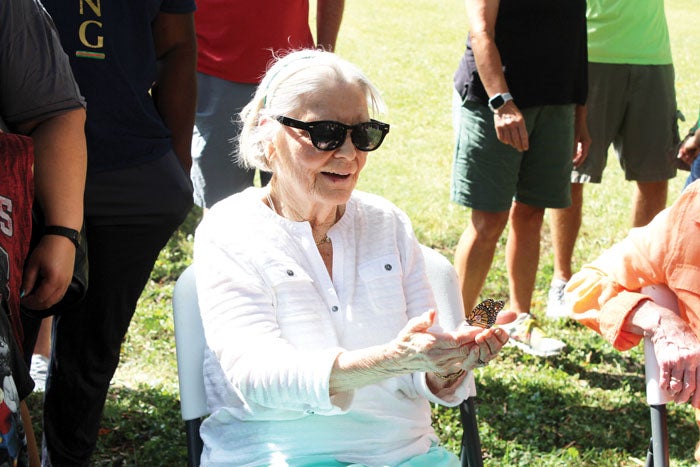Monarch butterflies released at Hurley Park
Published 12:00 am Sunday, October 10, 2021

- Gerry Hurley holds a monarch butterfly at the release event at Hurley Park.. Photo by Kaisha Brown
By Sarina Dellinger
For the Salisbury Post
We were so thrilled to host our annual butterfly release event on Sunday, Oct. 3, after skipping it in 2020 due to the ongoing pandemic. Thank you to those who came out to celebrate and learn about monarch butterflies. If you missed the event, today I’m going to provide a recap and how to help monarch butterflies.
Families gathered in the annex at Hurley Park to watch All-A-Flutter Farms release 50 monarch butterflies and send them on their migration journey to Mexico. Prior to the release, All-A-Flutter gave a wonderful educational presentation that allows the kids to demonstrate and participate in learning about the monarch butterfly. All butterflies released at this event are tagged through www.monarchwatch.org.

All-A-Flutter Farms gave an educational presentation at the monarch butterfly release event at Hurley Park. Photo by Kaisha Brown
The iconic monarch butterflies have risen to conservation fame over the past 30 years due to their drastic decline in populations. The cause for this decline has been primarily loss of habitat. Many different organizations have created efforts to boost populations through habitat improvement, butterfly rearing and education. This species of butterfly has up to four generations a year, each one traveling further north, until the last generation of the summer which has the task to migrate south into Mexico. The timing of our event means that some of the butterflies released from Hurley Park will fly over 2,000 miles and into Mexico for the winter!
How can you help the beloved monarch? Plant milkweed. This particular plant is the only host plant for the monarch butterflies. This means that they must lay their eggs on a milkweed plant because that is the only plant they eat as a caterpillar. Therefore, planting milkweed can help to attract these butterflies to your yard. Many species of milkweed are easy to start from seed. It’s best to start these seeds in containers and lightly cover them with soil, about ¼ of an inch. They may be slow to germinate, especially if you are planting in the fall. Many milkweed species prefer a winter dormancy before sprouting so I prefer to keep the seeds in the refrigerator for the winter and start them in the spring. If seed starting is not your forte, many local garden centers offer these plants fully grown. Just be sure to select the species that will work best in your garden, some can multiply rapidly and some prefer wetter soil.
If you have questions about Hurley Park, how to book events, or what is going on, please give us a call at 704-638-4459, or contact us on Facebook or Instagram @HurleyParkNC. If you would like to donate to Hurley Park, visit our website at salisburync.gov/hurleypark.
Sarina Dellinger is public garden manager with Salisbury Parks and Recreation.




